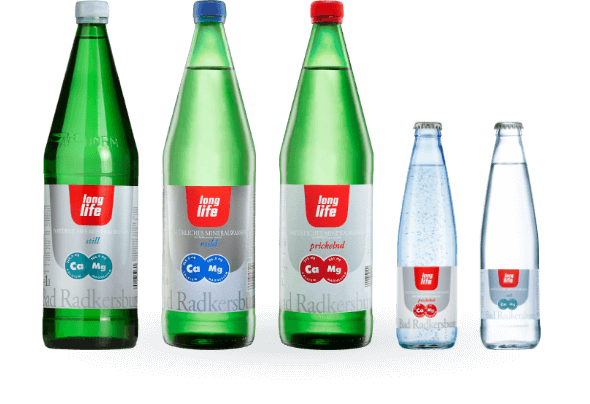
Magnesium
Magnesium causes better energy utilisation in the muscles and at the same time protects the sugar reserves of the liver. This leads to increased endurance during physical exertion and reduces the risk of muscle cramps.
Tasks of magnesium in the body:
- Electrolyte for approximately 300 enzymes - energy factor
- Healthy heart activity - cardiac rhythm stabilisation (together with potassium)
- Transmits nerve impulses
- Relaxes the muscles
- Antistress mineral
Magnesium deficiency
Scientific advice Prim. Dr. Bernd Zirm, Magnesiumforum Kurzentrum Bad Radkersburg
According to studies by the Magnesiumforum Bad Radkersburg (1996/97), 20% of the Austrian population have a magnesium deficiency in their blood. Causes are poor diet, chronic stress, sports without magnesium intake and diseases such as diabetes mellitus and heart diseases.
... and a healthy mind
Magnesium also promotes concentration and counteracts physical and mental stress.

Calcium
An adult has about 1 to 1.5 kg of calcium in the body. Most of it in the bones. Calcium components dissolved in the blood must be supplied to the body every day, otherwise deficiency symptoms can occur.
Functions of calcium in the body
- Participates in forming bones and teeth
- Important factor in blood clotting
- Transmits nerve impulses to muscle cells
- Participates in muscle irritability and muscle contraction
- Regulates the heart rhythm together with magnesium and potassium

Chloride
Together with sodium and potassium, chloride is significantly involved in the electrolyte and water balance and, together with sodium, regulates the acid-base balance in addition to blood pressure. Inasmuch as chloride is also a component of the hydrochloric acid in the stomach, the mineral has an important function both in digestion and defending against pathogens. Due to the connection with sodium, chloride in the form of table salt, like sodium, is sufficiently absorbed through food.

Sodium
Sodium is contained in all cells and body fluids and is vital for maintaining the water balance due to its osmotic activity. Together with chloride, the mineral regulates blood pressure, acid-base balance and various other functions such as transmitting stimuli in the nervous system. As part of table salt, sodium is ingested in sufficient quantities through food.
Roles of sodium in the body
- Regulates water balance
- Regulates acid-base balance
- Participates in the intake of carbohydrate (sugar)
- Muscle contraction - together with calcium and magnesium
- Enzyme activator
The hotly debated topic of sodium
Above a certain amount, sodium is unfavourable for the body if there is no or too little hydrogen carbonate. For information, Long Life contains 2,097 mg/l bicarbonate. When sodium and bicarbonate come together, sodium bicarbonate is formed, which also has a beneficial effect on the body's buffer system.
Sodium taken in the form of table salt in food increases blood pressure, so that the statement must be differentiated as to whether bicarbonate is present or not. Ultimately, this is the crucial point, because there are many Austrians who drink mineral water containing sodium and bicarbonate, but who also add a decent amount of salt or consume salty foods. It is therefore important to note whether sodium is present alone or in combination.
Note: Critics who claim that sodium increases blood pressure are right, but only as long as there is no bicarbonate, i.e. hydrogen carbonate.

Potassium
Potassium is a vital mineral of central importance for regulating water balance in the body. It is instrumental in maintaining acid-base balance and osmotic pressure. Along with sodium and chloride, potassium is one of the most important electrolytes in the body. Most of the mineral is present in cells, especially in the muscles. Potassium is required for regulating blood pressure, muscle contraction and heart function because it plays a central role in transmitting stimuli.

Lithium
Lithium is a trace element that has not previously been considered essential because it is not required for vital processes. However, it has been proven that even small amounts of lithium can have a positive effect on mental illnesses such as depression. Side effects can occur in the event of an overdose, but this is not to be expected when ingested through food. A study even showed that small amounts of lithium have a positive effect on life expectancy. The trace element is also credited with contributing to mental balance and increasing mental performance.

Bicarbonate
For the balance between acids and bases
Despite the system that keeps acids and bases in balance in the body, this sensitive system can get out of balance.
Due to modern nutritional and lifestyle habits, the human organism has to cope with very high amounts of acid, which are caused by the excessive consumption of protein, sugar, fat, coffee and alcohol. With so-called buffer systems, the body ensures that the pH value in body fluids remains constant. These buffering systems can convert or balance an acid or base supply.
Role of bicarbonate in the body
- Action as an acid buffer
- Acid-neutralizing effect

























